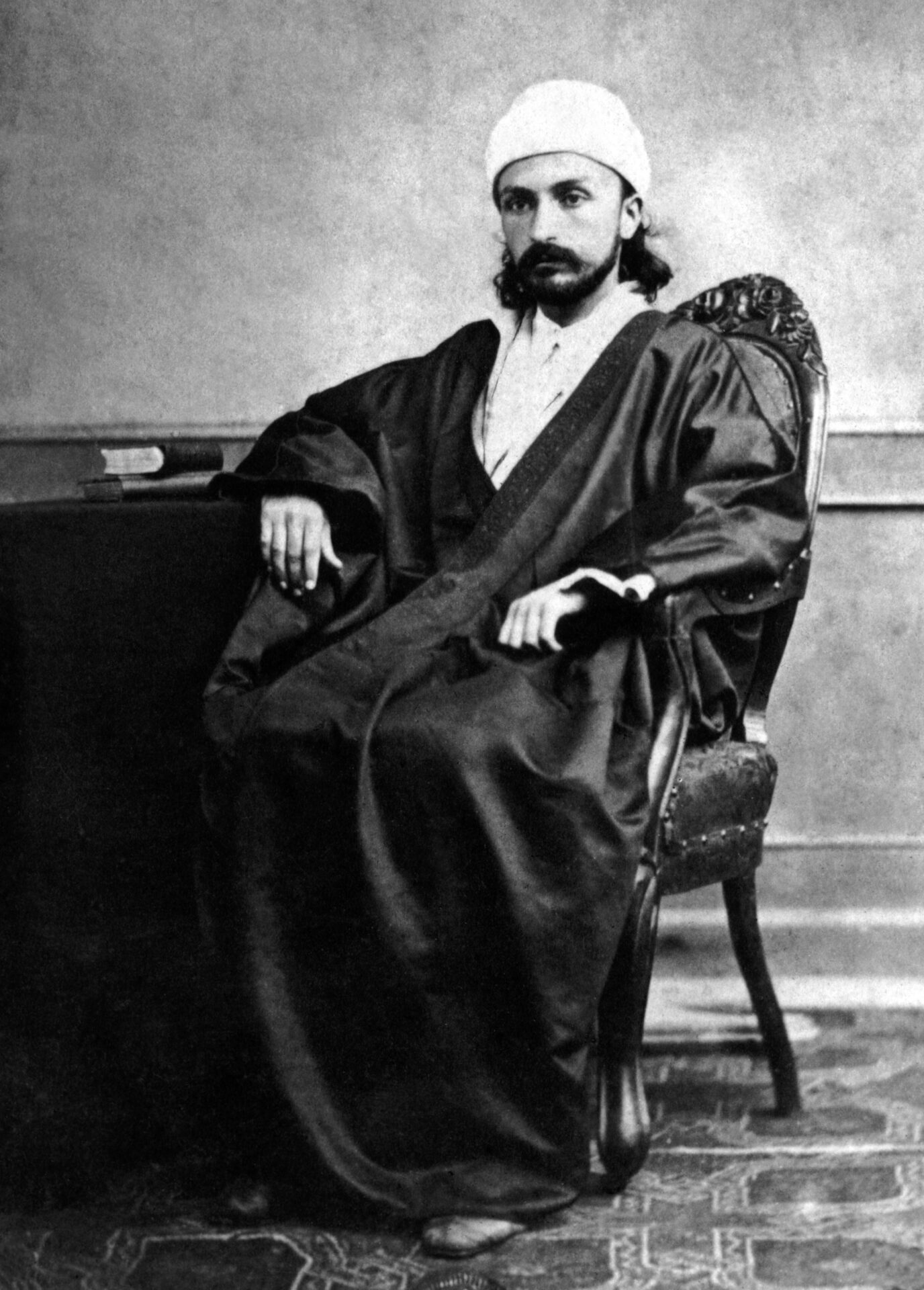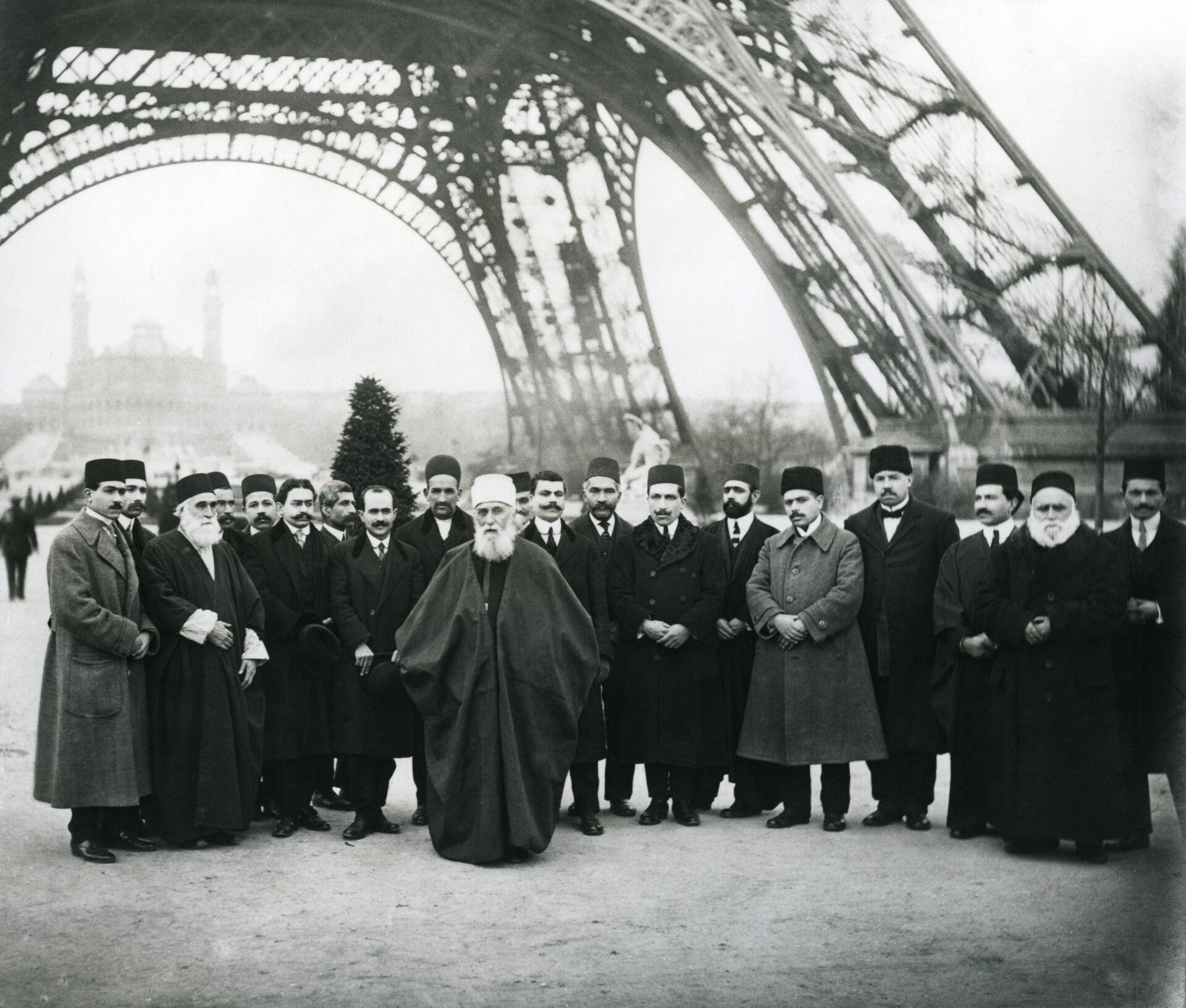In the footsteps of the Perfect Examplar
In the early 20th century, ‘Abdu’l-Bahá, the eldest son of Bahá’u’lláh, was the central figure of the Bahá’í Faith, renowned for his advocacy of social justice and as an ambassador for international peace.
Choosing unity as the fundamental principle of His teachings, Bahá’u’lláh ensured that His religion would never suffer the same fate as previous religions that divided after the death of their founder. In His writings, He asked all believers to turn to ‘Abdu’l-Bahá, His eldest son, not only as the interpreter of the Bahá’í Writings but also as the perfect example of the spirit of His Faith and teachings. Throughout his life, he presented with remarkable simplicity, to the great and the small, the teachings of Bahá’u’lláh for the social and spiritual renewal of society.
To celebrate ‘Abdu’l-Bahá’s exemplary life and to commemorate his death in November 2021, this page has been created.
Artistic expressions inspired by the life and work of ‘Abdu’l-Bahá
Life of ‘Adbu’l-Bahá
‘Abdu’l-Bahá, Bahá’u’lláh’s eldest son and the person appointed to lead the Bahá’í community at the time of His father’s death, devoted his life to promoting His father’s faith and His ideas of peace and unity. He encouraged the establishment of local Baha’i institutions and advised emerging social, educational and economic initiatives. After his release from a lifetime of imprisonment, ‘Abdu’l-Bahá began a series of journeys that took him to Egypt, Europe and North America.
‘Abdu’l-Bahá’s travels in the West contributed to the spread of Bahá’u’lláh’s teachings and the establishment of Bahá’í communities in Europe and North America. On both continents, he was well received by prominent audiences concerned with the state of modern society and dedicated to peace, women’s rights, racial equality, social reform and moral development.
Childhood
‘Abdu’l-Bahá was born on the evening of May 22, 1844, when, in the city of Shiraz, Iran, the Báb announced the beginning of a new religious cycle for the world. His early childhood was a privileged one, until the followers of the Báb – of whom Bahá’u’lláh was the best known – were subjected to severe persecution. After his father’s imprisonment in 1852, he followed his family into perpetual banishment from Iran. The banishment took the prisoners from Baghdad, to Andrinople, to Constantinople and finally to ‘Akká.

Designated Center of the Covenant
In His Most Holy Book, Bahá’u’lláh established a covenant with His followers, directing them to turn, after His death, to ‘Abdu’l-Bahá, “him whom God hath purposed, Who hath branched from this Ancient Root”. The authority of ‘Abdu’l-Bahá as the “Center of the Covenant” was also established in other texts, including the Will and Testament of Bahá’u’lláh.
After Bahá’u’lláh’s death in 1892, ‘Abdu’l-Bahá ensured the spread of his Father’s Faith to new territories, including North America and Europe. He received a steady stream of pilgrims from East and West, undertook an extensive correspondence with Bahá’ís and interested persons from around the world, and lived a life of exemplary service to the people of ‘Akká.
Travel to the West
After regaining his freedom in 1908, and after completing the sacred task of depositing the Báb’s remains in the mausoleum he had erected (1909), ‘Abdu’l-Bahá left Haifa for Egypt (1910), where he stayed for a year, spending his time meeting with diplomats, intellectuals, religious leaders and journalists.
In the late summer of 1911, he sailed for Europe, stopping at the French town of Thonon-les-Bains before heading for London. On 10 September, ‘Abdu’l-Bahá addressed an audience for the first time in his life from the pulpit of the Temple Church in London. This marked the beginning of a month-long stay in England, the scene of ceaseless activity devoted to promoting Bahá’u’lláh’s teachings and their application to many contemporary issues, through public addresses, meetings with the press, and private interviews. These days in London and then Paris set a pattern that he would follow throughout his travels – to the United States, Canada, and back to Britain, France, Germany, Austria-Hungary, and finally Egypt. He returned to the Holy Land on 5 December 1913.

The Great War
During the First World War, when ‘Abdu’l-Bahá’s communication with the Bahá’ís of the world was almost entirely interrupted, he devoted himself to the material and spiritual needs of those around him, personally organizing major agricultural activities and thus averting a famine that threatened the poor of all faiths in Haifa and ‘Akká. In recognition of his services to the Palestinian people, he was awarded a Knight of the British Empire in April 1920.
During the war years, he devoted much time to writing one of the most important works of his ministry: fourteen letters, known collectively as the Tablets of the Divine Plan, addressed to the Bahá’ís of North America, outlining the spiritual qualities and attitudes as well as the practical actions necessary to spread the Bahá’í teachings throughout the world.
Final Years
Until his old age, ‘Abdu’l-Bahá displayed remarkable vigour. He was a loving father, not only to the Haifa Bahá’í community, but also to a burgeoning international movement. His correspondence guided worldwide efforts to establish an organizational framework for the community. His interaction with a steady stream of pilgrims to the Holy Land was another means of providing guidance and encouragement to believers around the world.
He died on 28 November 1921 at the age of 77. His funeral was attended by 10,000 people from all religious backgrounds.
Writings from ‘Abdu’l-Bahá
The Writings and talks of ‘Abdu’l-Bahá are the fruit of more than half a century of prolific labour. ‘Abdu’l-Bahá was not a prophet and at no time claimed to have received direct revelation from God. But as the Centre of Bahá’u’lláh’s Covenant with His followers, and the appointed interpreter of the Bahá’í Revelation, His Writings both interpret and form a part of Bahá’í scripture.
His prodigious output so far gathered in published volumes consists of personal correspondence, general letters, expositions of specific themes, books, prayers, poems, public talks, and recorded conversations. ‘Abdu’l-Bahá was recognized by all who came into contact with Him as a paragon of distinctive style and eloquence.
His words are as simple as the sunlight; again like the sunlight, they are universal…
Yone Noguchi, Japanese writer
It is certain and indisputable that the creator of man is not like man because a powerless creature cannot create another being. The maker, the creator, has to possess all perfections in order that he may create…The contingent world is the source of imperfections: God is the origin of perfections. The imperfections of the contingent world are in themselves a proof of the perfections of God.
Some Answered Questions, p. 5
There is one God; mankind is one; the foundations of religion are one. Let us worship Him, and give praise for all His great Prophets and Messengers who have manifested His brightness and glory.
‘Abdu’l-Bahá in London, p. 20
The highest station, the supreme sphere, the noblest, most sublime position in creation, whether visible or invisible, whether alpha or omega, is that of the Prophets of God, notwithstanding the fact that for the most part they have to outward seeming been possessed of nothing but their own poverty.
The Secret of Divine Civilization